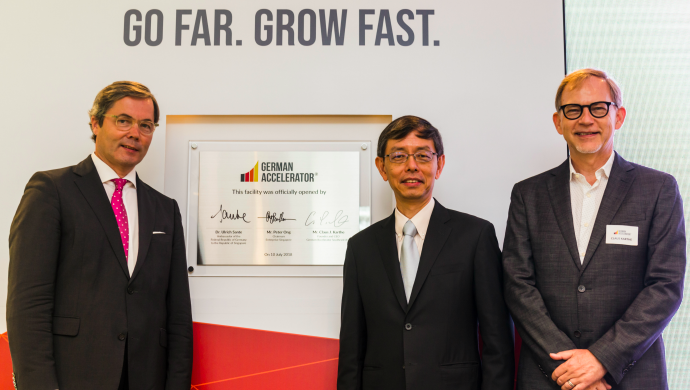It has also partnered with Enterprise Singapore to open two landing pads in Berlin and Munich for startups in the city-state to get to know and access the German market

From the inauguration of German Accelerator
German Accelerator, a programme supported by the German Federal Ministry for Economic Affairs and Energy to help the country’s tech startups go global, has opened an office in Singapore, its first outside of the US.
Under this programme, selected tech startups from Germany will stay and work in Singapore for five months, during which they will also travel to other parts of Southeast Asia. The startups will receive free mentoring, a safe sounding board, access to the local network of business partners and venture capitalists, and free office space.
Singapore is home to nearly 1,700 German companies.
In a press statement, German Accelerator has also announced a partnership with government agency Enterprise Singapore to open two landing pads in Berlin and Munich for startups in the city-state to get to know and access the German market.
Also Read: German Accelerator debuts in Singapore with first 3 startups
“Southeast Asia is the best place to be for foreign startups to understand the heterogeneous Asian market and to begin an Asian expansion strategy. This is because Southeast Asia presents a tremendous opportunity with its large, youthful and digitally savvy middle class. Governments are also encouraging innovation, mobile capabilities and digitisation. The ecosystems comprising research institutes, government agencies and industries are relatively open to learning and supporting foreign startups,” Claus Karthe, Founder and CEO of German Accelerator South East Asia, said.
The Singapore office, as a base for Southeast Asia, came on the back of the signing of Memorandums of Understandings (MoUs) in May with various national agencies for innovation and technology across Southeast Asia. They include Enterprise Singapore, Thailand’s National Innovation Agency (NIA), Malaysia Digital Economy Corporation (MDEC), Saigon Innovation Hub (SiHub), and Indonesian Agency of Creative Economy (BEKRAF).
With these MoUs in place, German startups will be able to learn about these markets more quickly and effectively, as well as better access the relations that matter in trying to do business in this region.
According to Karthe, Singapore is a trading centre par excellence in Southeast Asia due to its fantastic infrastructure, excellent investment climate and growth-promoting programmes of a very open-minded government. “Combined with legal certainty and strong intellectual property protection, it is easy for German companies to gain a foothold here in Singapore to set up their Asian expansion. With our local expertise and connections, we are pleased to help German startups simplify and navigate their route to market in Southeast Asia.”
To date, the German Accelerator South East Asia has brought in eight startups to Singapore — namely Ecosus (agritech), Fractal Blockchain (regtech), iNDTact (high-performance sensor technology), Rytle (logtech), Startup Guide (publishing), Silexica (deep-tech), tiramizoo (logtech), and Wealthstone (fintech).
As a next step, the German Accelerator and Enterprise Singapore will develop landing pads for Singapore startups, starting with Munich, followed by Berlin. There will also be a two-phased programme spanning up to nine months to support Singapore’s deep tech startups.
The first phase covers preliminary tech evaluation and product-market fit assessments. Once deemed suitable for the market, the startup will proceed to the second phase, where it will be housed in co-working spaces in the market and connected to local mentors and suitable German Mittelstand to discuss possible collaboration.
Peter Ong, Chairman of Enterprise Singapore, said, “For our startups and businesses to remain competitive, it is important that they are connected to global innovation hubs and build a steady pool of talent. Enterprise Singapore will continue to work with partners such as the German Accelerator to boost our startup ecosystem by facilitating their co-innovation efforts and helping them find business partners in key hubs like Germany.”
Started in 2011, German Accelerator has offices in Silicon Valley, San Francisco, New York, and Boston, besides Singapore. Its mission is to support promising German startups and high-growth companies in their expansion into overseas markets. To date, the German Accelerator has nurtured over 180 startups, which have raised more than US$1 billion in venture funding.
The German Accelerator Southeast Asia (GASEA) runs an immersive five-month growth acceleration programme in Singapore, supporting high-potential German startups gain insight of the Southeast Asian market and make relevant connections to scale quickly into internationally-recognised ventures.
The post German Accelerator opens office in Singapore to help the European country’s startups go global appeared first on e27.